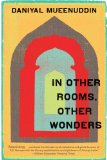Summary | Excerpt | Reading Guide | Reviews | Beyond the Book | Readalikes | Genres & Themes | Author Bio

“If that’s how you feel, I’ll go to my village and get rid of it.”
“I’m married. I have a son your age.”
She got out of bed, dressed, and went out, turning for a moment at the door. “I’ll never forget what you said when I told you.”
Where to go? She walked out the gate, in the direction of Lawrence Gardens, a few blocks away. Looking up into the cradle of branches in an enormous flame-of-the-forest tree, she thought, God, I’m nothing, look at how small I am next to this tree. It must be hundreds of years old. But I won’t give up the baby. I’d rather have the baby than Rafik.
That night she had nowhere else to sleep, and so went into Rafik’s quarters—she couldn’t bear to be with her husband, who used more and more of the rocket pills and stayed up all night smoking cigarettes.
“Forgive me,” Rafik said.
“I’m going to have it, you can keep me here or throw me out. In any case, I’ll have it in my village, there are no women here to help me.”
The next day he went to the bazaar in the morning, and when she came to his room for the afternoon nap he gave her a tiny suit, blue knitted trousers, a blue shirt, mittens, and a hat with a pompom, printed with little white rabbits.
So he accepted her condition and would run his hands over her growing belly, speaking to the life within. When it moved, she would put his hand there to show him. None of the other servants said anything openly, though they had expected it; and of course she could claim it was her husband’s child. Hassan once jokingly congratulated her, but she responded so gently that he too became silent.
Rafik obtained a month’s leave for her.
Before she left for the village he gave her a lot of money, ten thousand rupees, which he had saved up over the years, even after sending maintenance to his family.
“I can’t take this.”
“For me, for our baby—in case you need a doctor.”
She arrived at her village at dusk, taking a rickshaw from the bus station. The open field next to the village had become a collecting pool for the sewage from the city, the water black.
“Look, Saleema’s come,” the neighbors said, as she walked through the narrow lane to her mother’s house, carrying two plastic bags full of food, meat and sugar, tea, carrots, potatoes. The walled compound didn’t have a door, just a dirty burlap cloth made of two gunnysacks sewn together. Children ran behind her and peeked in.
Her mother sat on a charpoy, peeling potatoes, her long thin hair braided and red with henna.
She didn’t even get up, she kept peeling the potatoes.
“I’m back.”
“Are you in trouble? You’re pregnant.”
“No,” she lied.
“I bought a goat with the money you sent.”
“I can see.” The goat, tied to a stake, nibbled at a handful of grass.
The single room was almost completely bare, not even a radio.
Saleema made a curry, sitting by the little hearth, over a fire of twigs.
As they ate, sitting on the bed, Saleema asked, “Where’s my brother?”
“Bholu doesn’t come here much. I don’t give him money.”
“Where do you get money besides what I send?”
“It isn’t easy anymore, that I can tell you. You’ll find out someday what it’s like to be old. I sweep the Chaudrey’s house, I sell milk from the goat.”
The next day she told her mother about Rafik and the baby.
“Did your husband throw you out?”
“I forgot about him long ago.”
Excerpted from In Other Rooms, Other Wonders by Daniyal Mueenuddin. © 2009 by Daniyal Mueenuddin. Excerpted by permission of W.W.Norton & Company. All rights reserved. No part of this excerpt may be reproduced or reprinted without permission in writing from the publisher.




Every good journalist has a novel in him - which is an excellent place for it.
Click Here to find out who said this, as well as discovering other famous literary quotes!
Your guide toexceptional books
BookBrowse seeks out and recommends the best in contemporary fiction and nonfiction—books that not only engage and entertain but also deepen our understanding of ourselves and the world around us.